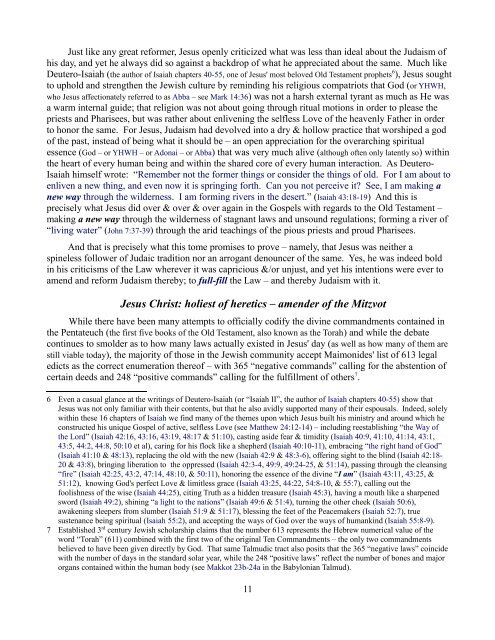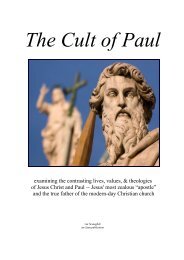Jesus Christ - a most Holy Heretic
An illuminating (and biblically exhaustive) examination of the little-known truth that Jesus Christ was not so much a supporter of the Old Testament laws of his day as he was a radically thorough reformer thereof
An illuminating (and biblically exhaustive) examination of the little-known truth that Jesus Christ was not so much a supporter of the Old Testament laws of his day as he was a radically thorough reformer thereof
Create successful ePaper yourself
Turn your PDF publications into a flip-book with our unique Google optimized e-Paper software.
Just like any great reformer, <strong>Jesus</strong> openly criticized what was less than ideal about the Judaism of<br />
his day, and yet he always did so against a backdrop of what he appreciated about the same. Much like<br />
Deutero-Isaiah (the author of Isaiah chapters 40-55, one of <strong>Jesus</strong>' <strong>most</strong> beloved Old Testament prophets 6 ), <strong>Jesus</strong> sought<br />
to uphold and strengthen the Jewish culture by reminding his religious compatriots that God (or YHWH,<br />
who <strong>Jesus</strong> affectionately referred to as Abba – see Mark 14:36) was not a harsh external tyrant as much as He was<br />
a warm internal guide; that religion was not about going through ritual motions in order to please the<br />
priests and Pharisees, but was rather about enlivening the selfless Love of the heavenly Father in order<br />
to honor the same. For <strong>Jesus</strong>, Judaism had devolved into a dry & hollow practice that worshiped a god<br />
of the past, instead of being what it should be – an open appreciation for the overarching spiritual<br />
essence (God – or YHWH – or Adonai – or Abba) that was very much alive (although often only latently so) within<br />
the heart of every human being and within the shared core of every human interaction. As Deutero-<br />
Isaiah himself wrote: “Remember not the former things or consider the things of old. For I am about to<br />
enliven a new thing, and even now it is springing forth. Can you not perceive it? See, I am making a<br />
new way through the wilderness. I am forming rivers in the desert.” (Isaiah 43:18-19) And this is<br />
precisely what <strong>Jesus</strong> did over & over & over again in the Gospels with regards to the Old Testament –<br />
making a new way through the wilderness of stagnant laws and unsound regulations; forming a river of<br />
“living water” (John 7:37-39) through the arid teachings of the pious priests and proud Pharisees.<br />
And that is precisely what this tome promises to prove – namely, that <strong>Jesus</strong> was neither a<br />
spineless follower of Judaic tradition nor an arrogant denouncer of the same. Yes, he was indeed bold<br />
in his criticisms of the Law wherever it was capricious &/or unjust, and yet his intentions were ever to<br />
amend and reform Judaism thereby; to full-fill the Law – and thereby Judaism with it.<br />
<strong>Jesus</strong> <strong>Christ</strong>: holiest of heretics – amender of the Mitzvot<br />
While there have been many attempts to officially codify the divine commandments contained in<br />
the Pentateuch (the first five books of the Old Testament, also known as the Torah) and while the debate<br />
continues to smolder as to how many laws actually existed in <strong>Jesus</strong>' day (as well as how many of them are<br />
still viable today), the majority of those in the Jewish community accept Maimonides' list of 613 legal<br />
edicts as the correct enumeration thereof – with 365 “negative commands” calling for the abstention of<br />
certain deeds and 248 “positive commands” calling for the fulfillment of others 7 .<br />
6 Even a casual glance at the writings of Deutero-Isaiah (or “Isaiah II”, the author of Isaiah chapters 40-55) show that<br />
<strong>Jesus</strong> was not only familiar with their contents, but that he also avidly supported many of their espousals. Indeed, solely<br />
within these 16 chapters of Isaiah we find many of the themes upon which <strong>Jesus</strong> built his ministry and around which he<br />
constructed his unique Gospel of active, selfless Love (see Matthew 24:12-14) – including reestablishing “the Way of<br />
the Lord” (Isaiah 42:16, 43:16, 43:19, 48:17 & 51:10), casting aside fear & timidity (Isaiah 40:9, 41:10, 41:14, 43:1,<br />
43:5, 44:2, 44:8, 50:10 et al), caring for his flock like a shepherd (Isaiah 40:10-11), embracing “the right hand of God”<br />
(Isaiah 41:10 & 48:13), replacing the old with the new (Isaiah 42:9 & 48:3-6), offering sight to the blind (Isaiah 42:18-<br />
20 & 43:8), bringing liberation to the oppressed (Isaiah 42:3-4, 49:9, 49:24-25, & 51:14), passing through the cleansing<br />
“fire” (Isaiah 42:25, 43:2, 47:14, 48:10, & 50:11), honoring the essence of the divine “I am” (Isaiah 43:11, 43:25, &<br />
51:12), knowing God's perfect Love & limitless grace (Isaiah 43:25, 44:22, 54:8-10, & 55:7), calling out the<br />
foolishness of the wise (Isaiah 44:25), citing Truth as a hidden treasure (Isaiah 45:3), having a mouth like a sharpened<br />
sword (Isaiah 49:2), shining “a light to the nations” (Isaiah 49:6 & 51:4), turning the other cheek (Isaiah 50:6),<br />
awakening sleepers from slumber (Isaiah 51:9 & 51:17), blessing the feet of the Peacemakers (Isaiah 52:7), true<br />
sustenance being spiritual (Isaiah 55:2), and accepting the ways of God over the ways of humankind (Isaiah 55:8-9).<br />
7 Established 3 rd century Jewish scholarship claims that the number 613 represents the Hebrew numerical value of the<br />
word “Torah” (611) combined with the first two of the original Ten Commandments – the only two commandments<br />
believed to have been given directly by God. That same Talmudic tract also posits that the 365 “negative laws” coincide<br />
with the number of days in the standard solar year, while the 248 “positive laws” reflect the number of bones and major<br />
organs contained within the human body (see Makkot 23b-24a in the Babylonian Talmud).<br />
11

















